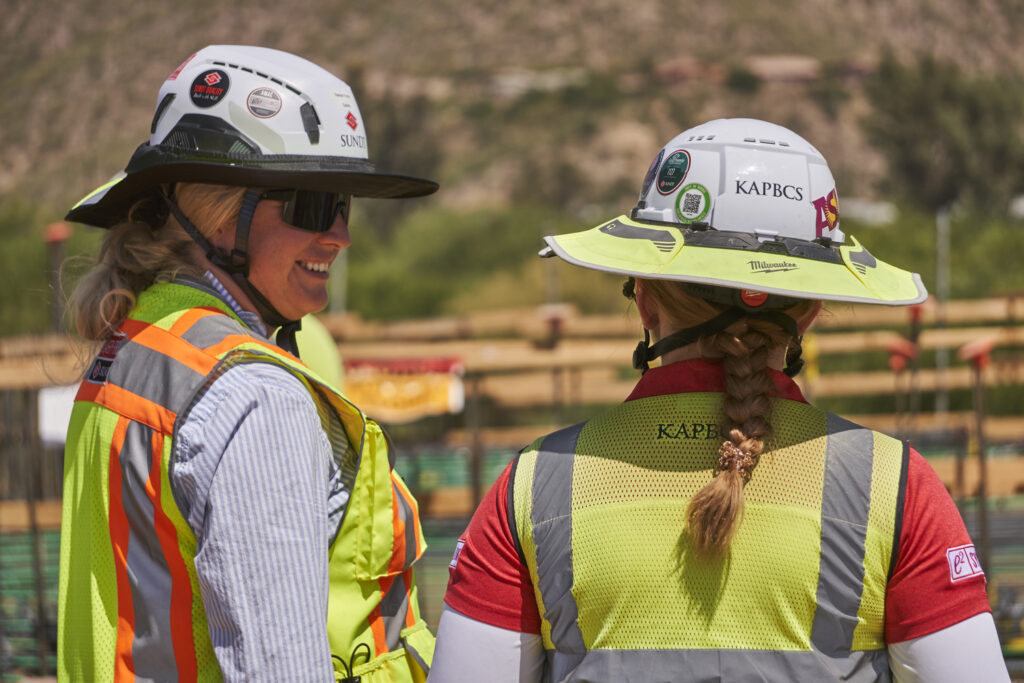
Recruiting and retaining women in construction involves more than just hiring them—it’s imperative to create an environment where they thrive. By recognizing the unique skills women bring to the field and championing their career growth, we can improve project culture, safety and performance.
This is supported by two studies conducted by The National Center for Construction Education and Research (NCCER) in 2023. One study looked at the barriers women face in progressing their careers. Overwhelmingly, it found that women in the field are often encouraged towards administrative, office-based roles, taking them out of the field entirely.
While that path may be right for many, according to Sundt Senior Superintendent Catherine Osborne, “the role of superintendent is not often presented as an option for women unless they have someone actively advocating for their career growth.”
Catherine joined Sundt with more than two decades of industry experience. She was encouraged from a young age to pursue the trades and began her career as a carpenter, where she eventually worked her way to senior project superintendent. She still holds her journeyman card and general contractor’s license to this day.
“I was lucky to be surrounded by a family of people in the ,” said Catherine. “But, not many women have that background, and that’s all the more reason the industry must support their growth.”
Recognizing Their Skills
Sundt Project Superintendent Maria Luna moved into her role just over two years ago. For Maria, being a superintendent was “always the goal,” but the opportunity didn’t come her way until she joined Sundt. According to NCCER, women who have active sponsors for their career growth are more likely to gain leadership opportunities in construction.
“I doubted myself about becoming superintendent, but I knew I was good at it, and that I could make a bigger impact in this role,” said Maria. Project Executive Holly Horsak and El Paso Regional Manager Bob Aniol were integral to Maria’s career transition, who championed her for the role.
A second NCCER study pinpointed the unique skills women in leadership bring to a jobsite. It addressed how the industry misses out on the value women bring to leadership roles within a predominantly male workforce. The most common skills? Team focus, attention to detail and increased safety.
Field Superintendent Emily Tucker originally pursued pre-med at the University of Arizona, but soon found her calling in construction management. “I didn’t grow up around construction, so I had to find my way there,” said Emily. “I’m so glad I fell into it.”
According to Emily and Maria, having people who advocated for their growth and provided training increased their confidence and helped them feel stronger in their skillsets.
Focus on Teamwork
Most women who were part of NCCER’s study agree that the biggest impact women bring to the field is a focus on building fluid team collaboration. Maria found success in sustaining positive client and trade partner relationships. Her dedication to understanding client needs is apparent at the University of Texas at El Paso, where she served as superintendent for two key projects: the Advanced Manufacturing and Aerospace Center and Texas Western Hall.
“I think everyone, no matter their identity, has different skills when it comes to creating relationships. It’s important to represent all perspectives in leadership. The result is a comfortable space for everyone.”—Maria Luna, Project Superintendent
According to Emily, one way women build a team mentality is that they are more likely to admit when they don’t know the answer. “The women I admire in leadership create an environment that makes it okay to ask questions.” Once that atmosphere is established, Emily said it’s easier to promote collaboration on project solutions, leading to greater outcomes for all stakeholders.
Catherine agrees, “many people have an outdated idea about what a senior superintendent is and how they behave. I believe one of the primary reasons I have been fortunate enough to have incredible success leading teams on large, complex projects is because I love elevating the voices of our teammates to foster an open and positive environment.”
Attention to Detail Increases Site Safety
“I don’t want to be cliché,” said Emily, “but women have a knack for looking at the details and for keeping a jobsite organized. While it may be stereotypical, this is hugely valued on site and comes with other benefits.”
NCCER’s research agrees with Emily. Sixty-nine percent of focus groups mentioned that women in the field have an increased attention to detail. Forty-five percent of focus groups recognized that women maintain an organized and clean jobsite.
These two skillsets have repeatedly shown themselves to be linked to the quality and safety of a project. “In my experience, women often pay closer attention to project details,” Maria noted. “I didn’t come up through the trades, and I make it a point to follow the process without shortcuts. This approach enhances both the quality and safety of our projects.”
Catherine also reflected on this: “I’ve been the only woman on site for much of my career. That isolation has given me plenty of time to reflect on how my intolerance for disorganization differs from the norm. It’s great to see expectations beginning to change.”
Building Women
Women bring unique qualities to a jobsite that fundamentally contribute to better project outcomes. NCCER’s study reported that in addition to these top three skills, women are also great multitaskers, work efficiently and are highly committed to project success.
When we uplift women, it will be easier for a younger generation of tradeswomen and engineers to see themselves in these roles. “For many women, they have to see it to believe it,” said Maria. “Sometimes, it’s hard for women to recognize that they deserve to be in the superintendent role, but they do, and they must have advocates along the way.”
Interested in building your career with Sundt? Check out our openings.